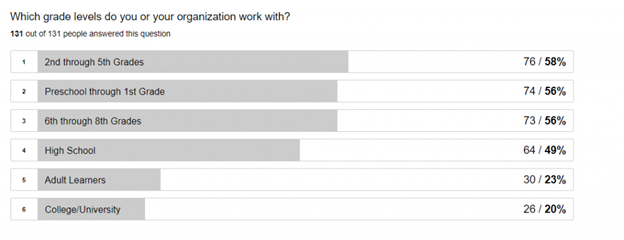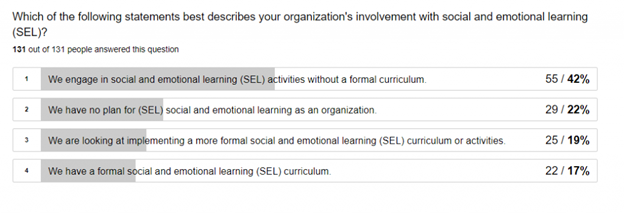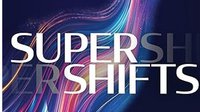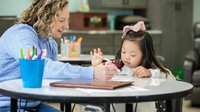Social and Emotional Learning (SEL) continues to receive increasing attention in the world of education. In our informal conversations with principals and teachers and parents, we hadn’t discerned any particular patterns or consensus in approaches, and it made us curious to explore the subject a bit more broadly. We hope that others will find this summary of findings from the small survey we conducted and the trends we discerned as interesting and thought-provoking as we do.
We received 131 responses to our survey prior to the date of this report. Survey responses were solicited via email and social media. Respondents reported working with a wide range of ages, as shown in the chart below, supporting the idea that social and emotional learning skills are deemed important at every level of education.

The level of interest in and involvement with SEL programs and activities was high for those who responded to this survey. This is not surprising, given that educators with an interest in the topic would be most likely to complete the survey. In fact, more than three-quarters of respondents (77%) either have a formal SEL curriculum (22%) or engage in SEL activities without a formal curriculum (55%).
For those who have a formal SEL curriculum, it was almost an even split between those who indicated that the program was self-developed (48%) and those who use a published curriculum (52%).

In terms of content and topic areas, respondents were asked to indicate which of a list of 12 topics they felt were important to include in an SEL program. If they had an SEL program in place, they were then asked to indicate which topics their program included. The following table summarizes the responses:
| Topic | Topic is Important Ranking | Topic is Important Percentage | Topic is Addressed Ranking | Topic is Addressed Percentage |
|---|---|---|---|---|
| Relationship management | 1 | 85% | 7 | 66% |
| Decision-making skills | 2 | 84% | 3 | 77% |
| Self-management | 3 | 84% | 1 | 79% |
| Social awareness | 4 | 84% | 2 | 79% |
| Self-awareness | 5 | 83% | 4 | 77% |
| Personal responsibility | 6 | 82% | 5 | 74% |
| Self-confidence | 7 | 73% | 6 | 68% |
| Empathy | 8 | 73% | 9 | 55% |
| Setting goals | 9 | 73% | 8 | 65% |
| Resilience | 10 | 67% | 10 | 43% |
| Conflict management | 11 | 61% | 11 | 40% |
| Flexibility / Adaptability | 12 | 59% | 13 | 32% |
| Integrity / Trustworthiness | 13 | 55% | 12 | 36% |
| Leadership | 14 | 43% | 14 | 27% |
It is important to note that the question of which topics are important was asked of all respondents, even those who do not have an SEL program in place, while the topics which are addressed in programs was only relevant for those who have programs in place.
Some interesting trends can be observed. All the topics, except one (Leadership), were felt to be important to include in an SEL curriculum by more than half of respondents. Six topics were rated important by more than 80% of respondents. And three others were rated important by over 70% of respondents. Thus, there seems to be strong agreement on at least some of the must-have skills for SEL.
- Many of the topics ranked most important relate to management of oneself, including self-management, self-awareness, personal responsibility, self-confidence and setting goals. Topics related to Interactions with others, including relationship management, social awareness and empathy, account for most of the other top-ranked skills. Decision-making was the only skill in the top group that fell outside those two domains (or arguably in both since decision-making can be conducted by oneself or in a group setting).
- The percentage of respondents reporting that a topic is important is consistently greater than the percentage of programs that address that topic. Thus, there is a suggestion at least that those who have programs of some type see gaps in them. The differences are generally small for the highest importance topics (10% differential or less). However, the most highly ranked topic in terms of importance, Relationship Management, does not rank nearly as well on being addressed in current programs (23% discrepancy). We also found it interesting to note that Empathy, a skill clearly associated with and arguably a prerequisite for Relationship Management, while rated as less important, also exhibits a discrepancy of the same magnitude. It would be interesting to explore this further to try to determine why the rankings related to interpersonal relationships were discrepant and why few programs address this highly rated topic.
- The topics ranked lower in importance demonstrate the greatest discrepancies. This suggests that educators have prioritized the most important topics in implementing SEL programs and activities. However, it could also be that respondents’ views of importance are influenced by the programs they have in place or are aware of.
- The topic with the greatest discrepancy was Flexibility / Adaptability, a skill that is highly valued in the workplace, but one which is developed in less than a third of the programs included in the responses to this survey (19% of all respondents). It may be that skills like flexibility and resilience, while important, are not considered as amenable to a lesson-plan approach and rely to a greater degree on underlying cognitive processes such as cognitive flexibility. Cognitive processes can be improved with the right kind of cognitive training, which differs significantly from traditional classroom instruction, which appears to be the typical format for SEL.
- Although respondents were offered an opportunity to suggest other topics, no one did so.
In considering how effective SEL programs are (only the respondents with programs or activities were asked this question), the unanimous feeling is that they are somewhat effective (64%) or very effective (36%). These conclusions seem to be based largely on informal methods of evaluation, however, since only 12% of those who responded to the survey (22% of those with programs) use an SEL assessment.
We want to thank everyone who took the time to respond to our survey and are happy to be able to share these perspectives with others. Questions on this summary or on any other aspect of the survey can be addressed to Betsy Hill at bhill@mybrainware.com.
About the authors

Betsy Hill is President of BrainWare Learning Company, a company that builds learning capacity through the practical application of neuroscience, helping parents unlock their child’s learning potential. She is an experienced educator and has studied the connection between neuroscience and education with Dr. Patricia Wolfe (author of Brain Matters) and other experts. She is a former chair of the board of trustees at Chicago State University and teaches strategic thinking in the MBA program at Lake Forest Graduate School of Management where she received a Contribution to Learning Excellence Award. She received a Nepris Trailblazer Award for sharing her knowledge, skills and passion for the neuroscience of learning in classrooms around the country. She holds a Master of Arts in Teaching and an MBA from Northwestern University. Betsy is co-author of the new book, “Your Child Learns Differently, Now What?”

Roger Stark is Co-founder and CEO of the BrainWare Learning Company. Over the past decade, he championed efforts to bring the science of learning, comprehensive cognitive literacy skills training and cognitive assessment, within reach of every person, and it all started with one very basic question: What do we know about the brain? From that initial question, Roger Stark pioneered the effort to build an effective and affordable cognitive literacy skills training tool, based on over 50 years of trial and error through clinical collaboration. He also led the team that developed BrainWare SAFARI, which has become the most researched comprehensive, integrated cognitive literacy training tool delivered online anywhere in the world. For more, follow BrainWare Learning on Twitter @BrainWareSafari. Roger is co-author of the new book, “Your Child Learns Differently, Now What?”











